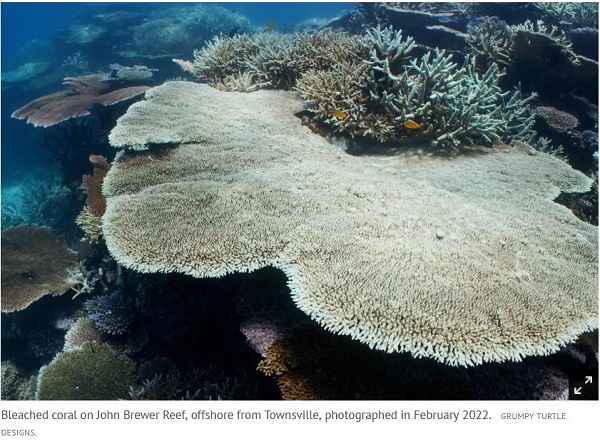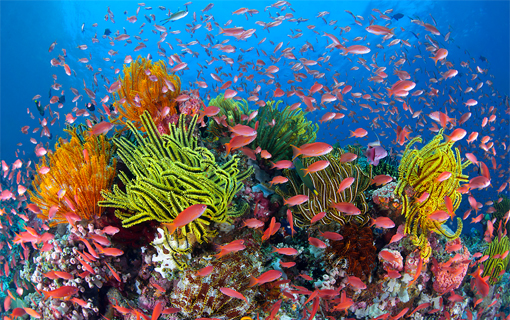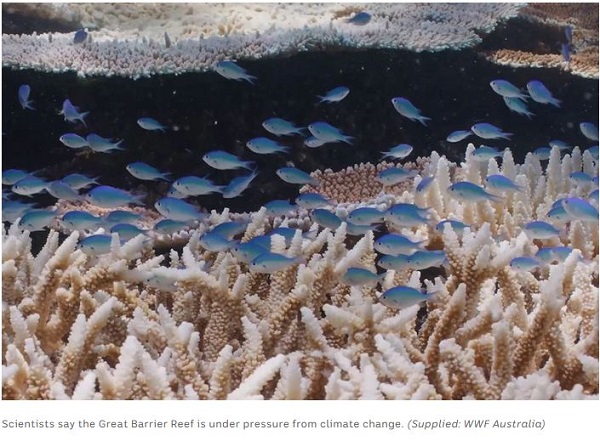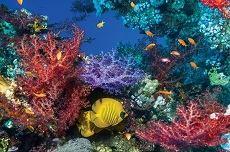
Scientists told us in early February this year that at 1.5°C the Great Barrier Reef would be toast. See Catastrophic worldwide reef warning is ‘even more dire than we’d previously thought’:
- New research shows global warming of 1.5C will be catastrophic for almost all coral reefs worldwide, even sites scientists once thought of as refuges – none of which are known in Australia.
The study is a dramatic escalation in expected outcomes and sobering news for economies like Australia that rely on reefs to support key industries including fishing and tourism.
James Cook University Associate Professor Scott Heron was part of the international study and says previous analyses had pointed to about 90 per cent of global reefs being affected at 1.5C of warming.
Under that scenario, about 10 per cent of the world’s reefs would have escaped frequent warming impacts via natural mechanisms like the consistent upwelling of cool, deep waters.
But the new analysis suggests it will be nothing like 10 per cent, more like 0.2 per cent.
“We are now looking at one fifth of one per cent of coral reef locations avoiding those frequent heat stress impacts,” Dr Heron says.
“There’s as many as one billion people around the world that rely upon the coral reef ecosystems for part of their sustenance or livelihoods. Australia is one of those countries, Australians are some of those people.”
“Our study has indicated that the situation global coral reefs are facing is even more dire than we’d previously thought and it’s all related to climate change.”
Coral bleaching usually comes late in season, but not in a La Nina year. Now, for the first time ever we have Great Barrier Reef facing another severe bleaching event ahead of UN delegation visit:
- The Great Barrier Reef is being hit with a widespread and severe bleaching event, just three days before a United Nations delegation is due to arrive to assess the health of the world heritage area.
The Great Barrier Reef Marine Park Authority (GBRMPA) confirmed the bleaching is widespread in both the far north and the central sections of the reef, with the bleaching in the central parts rated as “severe”.
Surveys are still underway to assess the full extent of the damage.
The last serious bleaching event on the reef occurred just two years ago.
The first mass bleaching event occurred in 1998, with repeat episodes in 2002, 2016, 2017 and 2020.
Let’s be clear. So far:
Aerial surveys have covered half of the 2,300km reef, with the worst bleaching observed in the park’s central region off Townsville, where corals on some reefs are dead and dying.
And:
- Bleaching is considered minor if less than 10% of corals on an individual reef are bleached. Levels up to 30% are categorised as moderate, up to 60% is major and beyond that, bleaching is considered severe.
The SMH says:
The Great Barrier Reef Marine Park Authority has reported severe bleaching to 60 per cent of the corals along a 500-kilometre stretch of the Great Barrier Reef between Innisfail and Mackay.
While we await the final report, what bothers me is that no-one is telling the truth about 1.5°C being a dud deal for the Great Barrier Reef. Even scientists who know the bad news are declining to tell us.
Dr David Wachenfeld, chief scientist of the Great Barrier Reef Marine Park Authority (GBRMPA), says:
<ul>
the reef was a “living, resilient, beautiful system” under growing threat, but we must not lose hope for its long-term survival.
“It really worries me that people are getting an impression that things are worse than they really are because what we need right now is for people to be inspired and determined to greater action to protect the reef,” he said. “We need the strongest and fastest possible global emissions reduction.
“It’s very difficult to see this happening to the reef, but we have to remember that the solution lies in long-term global emissions reduction and working to protect the resilience of the system.”
Elsewhere just in from the Washington Post:
-
The coldest location on the planet has experienced an episode of warm weather this week unlike any ever observed, with temperatures over the eastern Antarctic ice sheet soaring 50 to 90 degrees above normal. The warmth has smashed records and shocked scientists.
That’s roughly 30 to 50°C.
There you have the two most important events of the week.
Finally, here’s an image of the GBR vibrant with life:

This is what we have done:

If UNESCO do not deem the GBR under threat they will be left with little credibility.


New post up.
Have a look at this autogenerated article, ie, written by a computer, Human-induced climate change can cause widespread disruption in nature, say scientists:
The report clearly stated Climate Resilient Development is already challenging at current warming levels. It will become more limited if global warming exceeds 1.5°C (2.7°F). In some regions, it will be impossible if global warming exceeds 2°C (3.6°F).
This key finding underlines the urgency for climate action, focusing on equity and justice. Adequate funding, technology transfer, political commitment and partnership lead to more effective climate change adaptation and emissions reductions.
The nettle is in the hand, but not grasped.
Action, yes! So then you get situations like this
https://youtu.be/-0gbisTsj2w
People do the right thing, only to get toasted by political corruption. This could well be Australia.
Thankyou, bilb. Funnily enough, trust in government here plummeted last year.
Anything can happen.